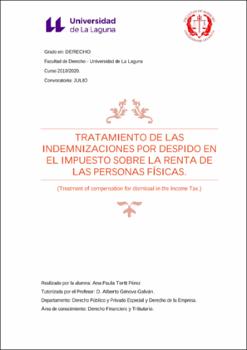Tratamiento de las indemnizaciones por despido en el Impuesto sobre la Renta de las Personas Físicas
Author
Tortt Pérez, Ana PaulaDate
2020Abstract
Por regla general, el contribuyente ha de tributar de los rendimientos íntegros del
trabajo realizados a lo largo del período impositivo según se vayan generando.
Sin embargo, cuando se obtiene una indemnización por despido, éstas estarán
sujetas -ya que se realizó el hecho imponible-, pero exentas de tributación, tal como
dispone la Ley del Impuesto. Esa exención está condicionada al cumplimiento de una
serie de requisitos regulados por la Ley para que se pueda beneficiar el contribuyente que
ha sido despedido, sin que tenga que tributar por la misma.
En cambio, cuando la cuantía indemnizatoria sea superior al límite estipulado por
Ley como exenta, ese exceso sí ha de tributar, aplicándosele las reducciones legalmente
establecidas, para esos rendimientos considerados irregulares. Usually, the taxpayer must pay taxes on the full income from work carried out
throughout the tax period as they are generated.
However, when the taxpayer get a compensation for dismissal, will be subject to
the tax -because the taxable event has already been carried out-, but these will be exempt
from taxation, as provided by Law. This exemption is conditioned on the fulfillment of a
series of requirements regulated by Law, so that the taxpayer who has been dismissed can
benefit without having to pay for it.
On the other hand, when the compensation amount is higher than the limit stipulated
by law as exempt, that excess must be taxed, applying the legally established reductions,
for those returns considered irregular.





